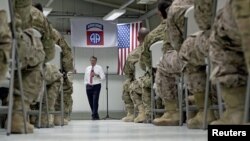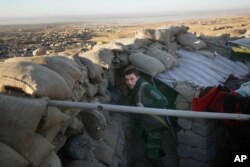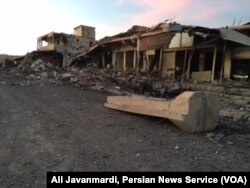Some crucial details have yet to be worked out as the U.S. prepares to send a new force of special operators to Iraq, but a clearer picture began to emerge Wednesday of a recalibrated strategy designed to slowly but surely destroy the Islamic State terror group in its heartland.
A day after U.S. Defense Secretary Ash Carter announced the creation of a "specialized expeditionary targeting force," military officials said that despite earlier, larger estimates, the force would consist of about 100 people, with fewer "trigger pullers" based on the ground in Iraq.
Their primary mission will be to find and capture key Islamic State militants to try to get what one official described as "actionable intelligence" that could lead to additional operations.
"What we're asked to do is accelerate the campaign," a U.S. official familiar with the planning process told VOA.
But the official, who was not authorized to speak publicly, said other key decisions, such as where to base the special forces, have yet to be made.
"Right now it's a concept for what we want to do," the official said. "We haven't designated the forces to do that."
‘Precise, surgical’ raids
One priority U.S. officials have laid out is the use of "very precise, very surgical" raids against high-value individuals who operate along the roads and other routes that have served as a lifeline between the Islamic State's key hubs in Iraq and Syria.
"A lot of this is about strengthening that border, shoring up the border between Iraq and Syria," said Operation Inherent Resolve spokesman Colonel Steve Warren, briefing reporters from Baghdad.
Last month, Kurdish peshmerga fighters, with the help of U.S. airstrikes, ousted IS forces from the Iraqi town of Sinjar, along Highway 47, a main road that helps connect Mosul to the Islamic State stronghold of Raqqa in Syria.
Severing supply routes
On the Syrian side, U.S.-backed forces also have been battling their way south, further helping to sever key supply routes.
The goal, a U.S. official said, is to cut off the group's fighters in northern Iraq.
"We are looking at the IS with a strategy that, in many respects, resembles trying to impose the death of a 1,000 cuts," said U.S. Army War College research professor W. Andrew Terrill.
"We are striking hard at their finances and we are attempting to contain, roll back and ultimately weaken them to the point they can no longer function. But all of that is a very difficult strategy," he warned. "You really have to absolutely have the best intelligence that you can possibly get."
U.S. military officials say the flow of intelligence has steadily improved, though it is still not enough.
"We are dropping more bombs because our capability to develop targets has increased," Warren said. "Intelligence is a curve, so as you learn more, the more you learn, the more you are able to learn."
The improved intelligence also could start to pay off in the coming days and weeks as the U.S.-led air campaign is set to get a boost from Britain, which decided Wednesday to follow France and expand its bombing of Islamic State targets to those in Syria.
Patience is key
But officials caution that seeing results on the ground in Syria and Iraq likely will take time even once the new special expeditionary targeting force is in place, with one official warning that the impact will not be "an exponential type of thing."
Instead, they point to the example of a U.S.-led raid last May that targeted an Islamic State official known as Abu Sayyaf, responsible for the terror group's finances and oil-smuggling operations.
Abu Sayyaf was killed in the raid but forces captured his wife, as well as computer hardware and data. Officials say information gained from that raid, described at times as a "treasure chest of intelligence," did not cause the Islamic State to immediately stagger, but instead set the stage for months of operations against the terror group until it finally began to dry up.







